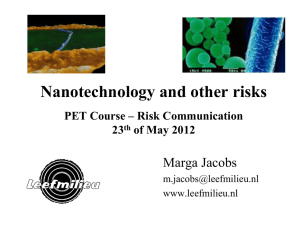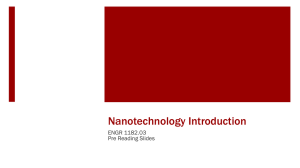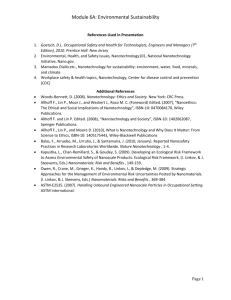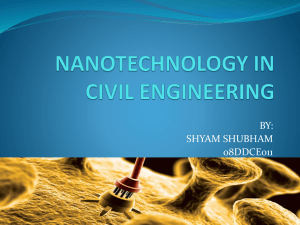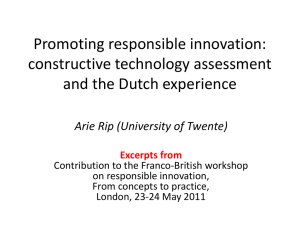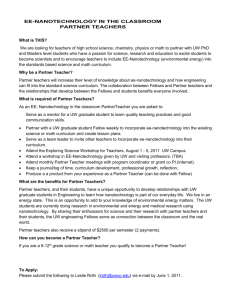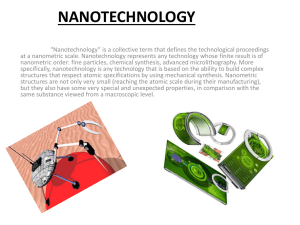Special Courses - University of Wisconsin Whitewater
advertisement
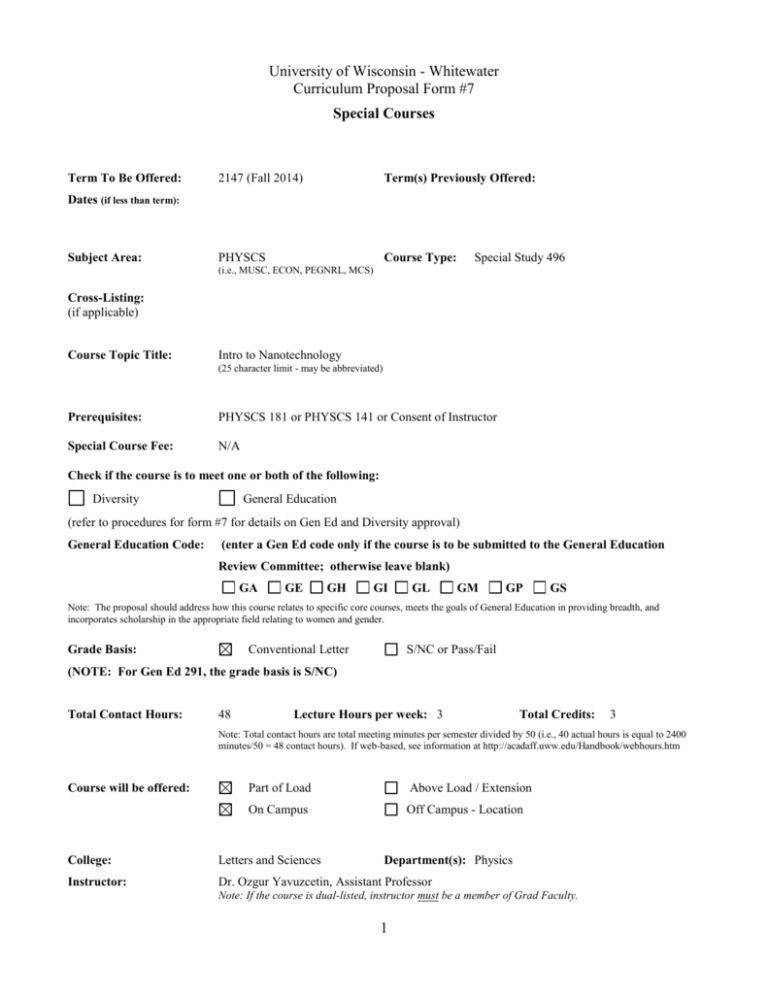
University of Wisconsin - Whitewater Curriculum Proposal Form #7 Special Courses Term To Be Offered: 2147 (Fall 2014) Term(s) Previously Offered: PHYSCS Course Type: Dates (if less than term): Subject Area: Special Study 496 (i.e., MUSC, ECON, PEGNRL, MCS) Cross-Listing: (if applicable) Course Topic Title: Intro to Nanotechnology (25 character limit - may be abbreviated) Prerequisites: PHYSCS 181 or PHYSCS 141 or Consent of Instructor Special Course Fee: N/A Check if the course is to meet one or both of the following: Diversity General Education (refer to procedures for form #7 for details on Gen Ed and Diversity approval) General Education Code: (enter a Gen Ed code only if the course is to be submitted to the General Education Review Committee; otherwise leave blank) GA GE GH GI GL GM GP GS Note: The proposal should address how this course relates to specific core courses, meets the goals of General Education in providing breadth, and incorporates scholarship in the appropriate field relating to women and gender. Grade Basis: Conventional Letter S/NC or Pass/Fail (NOTE: For Gen Ed 291, the grade basis is S/NC) Total Contact Hours: 48 Lecture Hours per week: 3 Total Credits: 3 Note: Total contact hours are total meeting minutes per semester divided by 50 (i.e., 40 actual hours is equal to 2400 minutes/50 = 48 contact hours). If web-based, see information at http://acadaff.uww.edu/Handbook/webhours.htm Course will be offered: Part of Load Above Load / Extension On Campus Off Campus - Location College: Letters and Sciences Department(s): Physics Instructor: Dr. Ozgur Yavuzcetin, Assistant Professor Note: If the course is dual-listed, instructor must be a member of Grad Faculty. 1 ~~~~~~~~~~~~~~~~~~~~~~~~~~~~~~~~~~~~~~~~~~~~~~~~~~~~~~~~~~~~~~~~~~~~~~~~~~~~~~~~~~~~~~~~~ Proposal Information: (Procedures for form #7) Description: Nanotechnology is the fabrication, study and manipulation of structures having sizes in the range from one to one hundred nanometers (a nanometer is a billionth of a meter). This length scale includes bulk materials and molecules that are typically less than one nanometer in size. This course will cover broad, interdisciplinary areas of physics, chemistry, materials science and engineering. By the end of the course, the students will understand the fabrication, manipulation and characterization of common nanomaterials. They will learn how nanotechnology is related to today’s state-of-the-art technological gadgets. If there are no schedule conflicts, invited guest speakers from various disciplines across campus will introduce nanotechnology from their perspectives. Students will use common nano-instruments that are available on campus and learn how to fabricate & characterize nano-samples through assigned experiments. Students will be assigned or asked to pick topics on nanotechnology, and they will present the results of their research to the class. Objectives: Since nanotechnology is an interdisciplinary field, students taking this course will develop a cross-disciplinary communication. They will learn the basics of the physical phenomena at nanoscales. Through the in-class experimental activities, students will gain hands-on experience and will develop a better understanding of most common tools used in nanotechnology. These activities will include; physical deposition, lithography, optical and electronic characterization of nanomaterials. The students will learn the language of nanotechnology, and they will be able to understand introductory articles about nanotechnology. State timeliness, need, and interest: Given the rapidly increasing technological outcomes from the field of nanotechnology, it is important that students with a general science background have a better understanding of which advancements are originating from nanotechnology. This course will use theory and lab skills from introductory physics courses and will focus on the world of nanotechnology. Science majors, and especially those with an emphasis in engineering, will find this course very beneficial, since we will cover up-to-date nanotechnological applications. UW-Whiteater has common nano-tools, such as: scanning electron microscope (SEM), atomic force microscope (AFM), sputter coater, evaporator, optical equipment and nano-particle analyzers across the campus. This course will provide students an opportunity to use these resources through guided experimental activities. Each fall UW-Whitewater hosts an annual Nanoscience Symposium. The course topics will overlap with the symposium presentations, and students will have a chance to hear about the most recent research going on in the field of nanotechnology. In-class experimental activities will be integrated into the lecture portion of the course. The experimental activities will demonstrate to the students the process of fabrication and characterization of nano-samples. The level and the complexity of the experiments will be adjusted to match student course background, skills and the availability of the instrument. Hands-on participatory and individualized activities (workshops only): Described in outline section. 2 Outline: The lecture emphasis and depth will depend on the student presentation, experimental or guest speaker activity of the week. Week 1 2 Date Sept. 3-5 Sept. 8-12 3 Sept. 15-19 4 Sept. 22-26 5 Sept. 29-Oct. 3 6 Oct. 6-10 7 Oct. 13-17 8 Oct. 20-24 9 Oct. 27-Oct. 31 10 Nov. 3-7 11 Nov. 10-14 12 Nov. 17-21 13 Nov. 24-26 14 15 Dec. 1-5 Dec. 8-12 Topic Introduction, history of nanotechnology Scaling laws in mechanics, optics, E&M, heat transfer, fluids and biology Basics of quantum mechanics and EM* spectrum Nanomaterials: Van der Waals force, fullerene (C60), CNTs*, nanowires, nanoporous templates, dendrimers and micelles Nanomechanics: Oscillations, high Q systems, cantilevers Nanomechanics: Lennard-Jones interaction, phonons, mass sensors (QCM*), AFM Nanoelectronics: Energy bands, band gaps, Fermi energy, quantum confinement, exitons Nanoelectronics: Quantum tunneling and STM*, field emission, Fowler-Nordheim tunneling, molecular electronics Nanoscale heat transfer: Mean free path, thermoelectrics, quantum thermal conductance, polaritons, plasmons Nanophotonics: Photon absorption/scattering, permittivity and extinction coefficient Nanophotonics: Color from nanoscale semiconductors, quantum dots, VECSELs* and edge-emitting lasers Nanophotonics:Near-field, and conventional optics, optical tweezers, solar cells Nanofluidics: Forces on a fluid, molecular dynamics and diffusion, electroosmosis Special topics & presentations Summary & presentations *EM: Electromagnetic *CNT: Carbon nanotube *QCM: Quartz crystal microbalance Chapters 1 2 3 4 5 5 6 6 Info Classes begin Activity: Tour of the labs Activity: Optical and dissection microscopes, scale bars Activity: Scanning Electron Microscope (SEM) -1- Activity: Scanning Electron Microscope (SEM) -2Guest Speaker: TBD Activity: Thin film deposition using sputter coater Activity: Atomic force microscope (AFM) -1- 7 Guest Speaker: TBD 8 Activity: Atomic force microscope (AFM) -2Guest Speaker: TBD 8 8 9 N/A N/A Activity: Evaporator and nano metallic film electronic measurement methods. Thanksgiving recess begins, 5 pm on Wednesday (26th). No activity Guest Speaker: TBD Classes end on Friday (12th). *STM: Scanning tunneling microscope *VECSEL: Vertical external cavity surface emitting laser Tests, assignments, and/or Evaluations: (include grading policy and grading scale) Tentative grading structure to be adjusted based on enrollment: Assigned experiments Homework Presentation Midterm Final Exam Total 25% 25% 15% 15% 20% 100% Assigned experiments: Depending on the topics, we will have nano experiments accompanied by reports. These experiments will include SEM & AFM imaging and characterization, sputter coater, evaporator, optical thickness measurement, electrical characterization of metallic nanofilms, nano-lithography. After performing the experiment, each student will submit a report. 3 Homework: There will be assigned homework weekly. Presentation: Each student will be asked to pick a topic of interest or will be assigned a topic in nanotechnology and will present it to the class. Midterm: The midterm exam will cover material from lectures, assigned experiments, homework and presentations. It will begin at the start of class and there will be one exam during the semester. Final examination: The final exam will cover material from lectures, assigned experiments, homework and presentations. It will begin at the time stated by the university. Overall Course Grading Scale: A AB+ B BC+ C CD+ D DF 95%—100% 90%—94% 86%—89% 82%—85% 78%—81% 74%—77% 70%—73% 66%—69% 61%—65% 56%—60% 50%—55% <50% Attendance policy with defined excuses: Regular attendance is required. In case of illness or other unavoidable reasons for missing class, the student should contact the instructor ahead of time and should be able to document the reason for being absent. Differentiation of Undergraduate/Graduate Requirements (if applicable): (include unique expectations of graduate students regarding content, intensity, and self-direction –see procedures page for more information on each of these) N/A If special course fee is requested, proposer must include justification and budget below - proposer will be notified of approval. N/A The University of Wisconsin-Whitewater is dedicated to a safe, supportive and non-discriminatory learning environment. It is the responsibility of all undergraduate and graduate students to familiarize themselves with University policies regarding Special Accommodations, Academic Misconduct, Religious Beliefs Accommodation, Discrimination and Absence for University Sponsored Events (for details please refer to the Schedule of Classes; the “Rights and Responsibilities” section of the Undergraduate Catalog; the Academic Requirements and Policies and the Facilities and Services sections of the Graduate Catalog; and the “Student Academic Disciplinary Procedures (UWS Chapter 14); and the “Student Nonacademic Disciplinary Procedures" (UWS Chapter 17). Bibliographies and Readings: These books are available through UW-Whitewater library. 4 Principal Textbook: Nanotechnology : understanding small systems / Ben Rogers, Sumita Pennathur, Jesse Adams. CRC Press, c2011 ISBN9781439849200 (hardcover : alk. paper);ISBN143984920X (hardcover : alk. paper) (Amazon sale price is ~$80 for hard copy and available for rental for $36 for 90-days, also available on CRC Press for 180 day rental for $44) Other Resources 1) Introduction to Nanoscience and Nanotechnology / Author(s): Chris Binns Copyright © 2010 John Wiley & Sons, Inc. Print ISBN: 9780471776475, Online ISBN: 9780470618837 2) Nanotechnology an introduction / by Jeremy Ramsden Elsevier Science distributor, 2011. Identifier: ISBN9780080964478 (electronic bk.);ISBN0080964478 (electronic bk.) 3) Introduction to nanoscience & nanotechnology / Gabor L. Hornyak ... [et al.]. CRC Press, c2009. ISBN9781420047790 (hardcover : alk. paper);ISBN1420047795 (hardcover : alk. paper) 4) Encyclopedia of Nanoscience and Society David H. Guston, editor. Sage, c2010. ISBN9781412972093 (electronic bk.);ISBN1412972094 (electronic bk.) 5) Nanotechnology science, innovation and opportunity / Lynn E. Foster. Prentice Hall PTR, c2005. ISBN0137025750 6) Nanotechnology molecular speculations on global abundance / edited by B.C. Crandall . MIT Press, c1996 ISBN0262032376 (hc : alk. paper);ISBN0262531372 (pb : alk. paper) 7) Nanotechnology : basic science and emerging technologies / Michael Wilson ... [et al.]. Chapman & Hall/CRC, c2002 ISBN1584883391 (pbk.) 8) Nanotechnology risk, ethics and law / edited by Geoffrey Hunt and Michael D. Mehta. Earthscan, 2006 ISBN1844073580 9) Principles of nanotechnology : molecular-based study of condensed matter in small systems / G. Ali Mansoori. World Scientific, c2005 ISBN9812561544;ISBN9789812561541;ISBN9812562052;ISBN9789812562050 10) Nanofuture : what's next for nanotechnology / J. Storrs Hall. Prometheus Books, 2005 ISBN1591022878 (alk. paper);ISBN9781591022879 (alk. paper) 11) Hacking matter levitating chairs, quantum mirages, and the infinite weirdness of programmable atoms / Wil McCarthy. Basic Books, 2004, ©2003 ISBN9780786723416 (electronic bk.);ISBN0786723416 (electronic bk.) *Some of the books listed above have online access. **The remainder of the bibliography will be based on journal publications and other online sources to be assigned by the instructor. ** Subject areas listing(see page 14) 5 University of Wisconsin - Whitewater Curriculum Proposal Form #7 Signature Page for Special Courses Term to be offered: 2147 (Fall 2014) Subject Area : PHYSCS Course Type: Special Study 496 (i.e., MUSC, ECON, PEGNRL, MCS) Cross-Listing: (if applicable) Course Topic Title: Intro to Nanotechnology (25 character limit - may be abbreviated) If taken for Gen Ed credit: Chair, General Education Review Committee _________________________ Date___________________ If taken for Diversity Credit: Chair, Diversity Committee _______________________________________ Date __________________ See special travel study guidelines and restrictions at Travel Study Information Authorized Signatures: Department Chair Date College Dean Date Graduate Dean Date (if applicable) Assoc Vice Chancellor Date ** Subject areas listing(see page 14) 6
